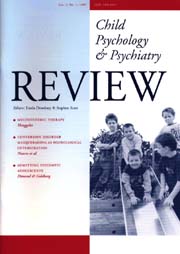Article contents
Neuropsychological Advances in Child and Adolescent Mental Health: The Decade of the Brain
Published online by Cambridge University Press: 01 September 1999
Abstract
As the ‘decade of the brain’ comes to a close, it is clear that the field of neuropsychology has made many vital contributions to evaluation, treatment, and research issues in child and adolescent health care. In the study of brain-behaviour relationships, the neuropsychologist plays a unique role. The practice of child neuropsychology is differentiated from adult work because developmental and environmental influences have a significant impact on practice. The various goals of the child neuropsychologist may include psychoeducational and neuropsychological assessment, the exploration of brain-behaviour relationships, consultation with a variety of professionals ranging from teachers to neurologists, and rehabilitation training. Advances in medical treatment have contributed to an expanding population of children and adolescents with neurological and/or neuropsychiatric concerns. New research in this field has also provided evidence of disordered or dysfunctional neurological systems in a number of childhood disorders and psychiatric conditions. This paper reviews some contributions that neuropsychology has made to the health care of children and adolescents in the past decade.
- Type
- Commissioned Review
- Information
- Copyright
- © 1999 Association for Child Psychology and Psychiatry
- 4
- Cited by




